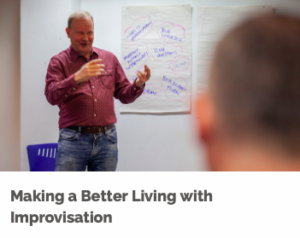Friends and colleagues sometimes tell me that people fear failure. You’ve probably noticed how trendy books and articles fetishise failure, positioning it as:
- the inevitable starting point for success
- our default state – we are incompetent (until we’ve taken your training programme)
- a problem to be solved if we are to make any progress
To take just one example, from a book currently reading, ‘’TO FOLLOW” – . The statement is presented with no evidence whatever, as usual with this cliched contention. You can Google a million more (literally), if in doubt that ‘failure’ outperforms ‘success’ as a topical topic.
When you fear failure, what’s at stake? Perhaps your entire prospects of success! It’s all a matter of stance or conceptual framing. What you choose to pay attention to makes a significant difference to what happens.
The clients I work with and the participants in my events rarely tell me that they fear failure. That’s true even when they are in situations often considered as failure-inducing fear pits – such as being asked to improvise or give a presentation, for example.
Perhaps they are silent on the matter, fearful even of naming their fear – although they’re certainly vocal about much else. Or maybe we are structuring our events in such a way that ‘fear of failure’ doesn’t get invited into the room. Instead, ‘What does success look like’ or ‘Curiousity about what might happen now’ replace it at the party.
Inner Game guru Tim Gallwey had a nice take on this at his UK seminar, in a story from his tennis career, when he played a tournament as the ‘Most improved player of year’. As he said, that title was a dubious honour, as it all depends on how poor he was when the improvement started. Anyway, here he was in a tournament, asking himself in a wonderful sequence of inner dialogue, ‘Do you want to win over your opponent, or over your fear? What’s the worst that could happen here? 6-0, 6-0. Then what?’
Well, his thoughts continued, he’d be out of the tournament, back to work, and having to explain himself. A short period of embarrassment, but a week later and no one would be thinking about it any more.
And so for him the tournament turned into a choice between ‘Play to Win’ or ‘Play to Play’. I guess we all know about Play to Win. The point of the match or the tournament is to win it. Anything else, by contrast, is failure – and if you fear failure, then there’s a lot to fear, as there are many more losers than winners.
Play to Play, by contrast, is a key improvisational principle (Easy – Your LIFEPASS to Creativity and Confidence),. It reminds you that you can get a lot more from any game by allowing yourself the full experience of playfully exploring the contours of the rules, the gameplay and your performance.
Selecting this approach worked for Gallwey: he won his first round match and lost respectably to a higher-ranked opponent in round two.
It’s worth paying attention to our inner dialogues regarding fear, failure, success and play. Each of these are plausibly critical variables in life, which means that our self-talk on the topic will make a difference to how we perform. If we foreground fear, we’ll be inhibited, probably over-cautious, fail to notice and take our chances. If we are frightened enough, we may become perfectionists and not play at all.
Conversely, if we focus on playing well or enjoying the game, our performance will improve. And it’s easy – a decision you can make at any time – to change the questions you are asking yourself, the comments you make to yourself, your narrative in relation to the matter at hand.
There’s no fixed level of how good (or bad) you are at something. On some days you’ll be better than others, and you can influence that by attending to the critical variables – including this inner dialogue.
What might you win by playing to play, instead of fearing failure when failure has few consequences?



